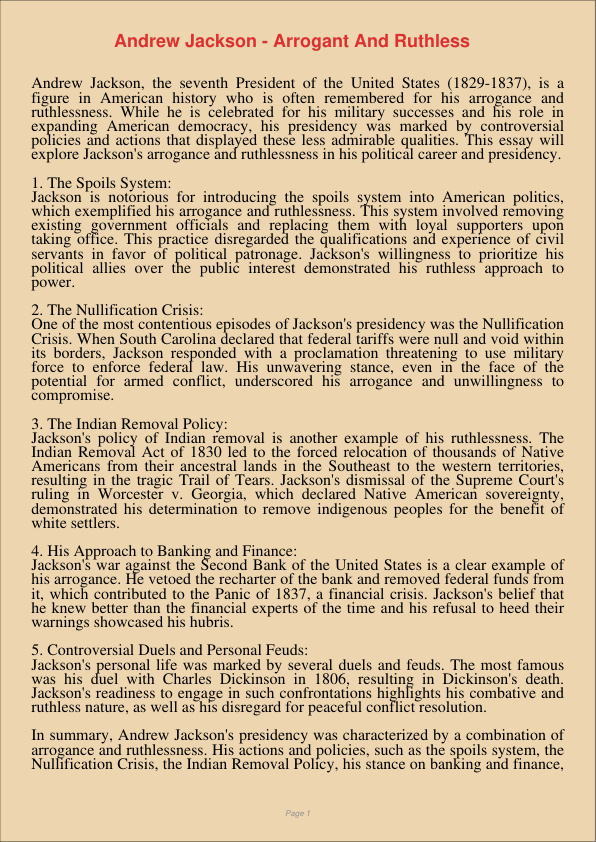Andrew Jackson, the seventh President of the United States (1829-1837), is a figure in American history who is often remembered for his arrogance and ruthlessness. While he is celebrated for his military successes and his role in expanding American democracy, his presidency was marked by controversial policies and actions that displayed these less admirable qualities. This essay will explore Jackson’s arrogance and ruthlessness in his political career and presidency.
-
The Spoils System: Jackson is notorious for introducing the spoils system into American politics, which exemplified his arrogance and ruthlessness. This system involved removing existing government officials and replacing them with loyal supporters upon taking office. This practice disregarded the qualifications and experience of civil servants in favor of political patronage. Jackson’s willingness to prioritize his political allies over the public interest demonstrated his ruthless approach to power.
-
The Nullification Crisis: One of the most contentious episodes of Jackson’s presidency was the Nullification Crisis. When South Carolina declared that federal tariffs were null and void within its borders, Jackson responded with a proclamation threatening to use military force to enforce federal law. His unwavering stance, even in the face of the potential for armed conflict, underscored his arrogance and unwillingness to compromise.
-
The Indian Removal Policy: Jackson’s policy of Indian removal is another example of his ruthlessness. The Indian Removal Act of 1830 led to the forced relocation of thousands of Native Americans from their ancestral lands in the Southeast to the western territories, resulting in the tragic Trail of Tears. Jackson’s dismissal of the Supreme Court’s ruling in Worcester v. Georgia, which declared Native American sovereignty, demonstrated his determination to remove indigenous peoples for the benefit of white settlers.
-
His Approach to Banking and Finance: Jackson’s war against the Second Bank of the United States is a clear example of his arrogance. He vetoed the recharter of the bank and removed federal funds from it, which contributed to the Panic of 1837, a financial crisis. Jackson’s belief that he knew better than the financial experts of the time and his refusal to heed their warnings showcased his hubris.
-
Controversial Duels and Personal Feuds: Jackson’s personal life was marked by several duels and feuds. The most famous was his duel with Charles Dickinson in 1806, resulting in Dickinson’s death. Jackson’s readiness to engage in such confrontations highlights his combative and ruthless nature, as well as his disregard for peaceful conflict resolution.
In summary, Andrew Jackson’s presidency was characterized by a combination of arrogance and ruthlessness. His actions and policies, such as the spoils system, the Nullification Crisis, the Indian Removal Policy, his stance on banking and finance, and his personal confrontations, all reflect these traits. While he is celebrated for his leadership during the War of 1812 and his role in expanding American democracy, it is essential to recognize and critically examine the less admirable aspects of his legacy, which have left a lasting impact on American politics and society.

「真诚赞赏,手留余香」
真诚赞赏,手留余香
使用微信扫描二维码完成支付
